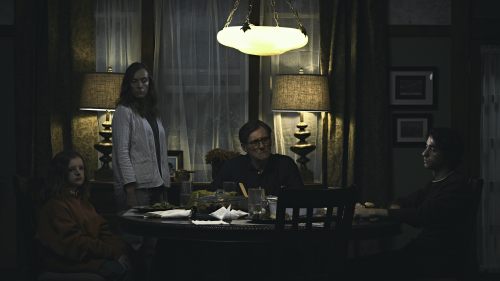The Overlook Film Festival Review: STILL/BORN
Brandon Christensen’s Still/Born starts out so strong. Though its themes and even execution are not revolutionary – the horror of new motherhood, the exhaustion and stress manifested into a supernatural evil – the first half of this film is elegant and effective, a legitimately good time.
It’s a shame that the second half can’t sustain it.
Christie Burke plays Mary, just returned from the hospital with her newborn baby to a brand new, giant house that is thanks to her husband’s recent promotion. Jack (Jesse Moss) is a little more concerned with the trappings of success than Mary, but it’s clear there’s a lot of love between the two of them, and Jack’s a good husband, if a somewhat absent one during this tumultuous time, a bit preoccupied with his job over his growing family.
Mary faces the challenges of many new mothers: no sleep, separation anxiety, isolation. Like many newborns, Adam won’t breastfeed, and as Jack casually sticks a bottle in his mouth, Mary looks devastated with guilt, literally incapable of providing her child with nourishment. Jack, unsurprisingly, doesn’t appear to appreciate the weight of this setback.
A new baby and a new house make for a trying combination by themselves, but Mary’s experience is especially traumatic: see, her baby Adam was a twin, but he was the only one to survive labor. The nursery still holds an empty crib with the name “Thomas” hanging above it in playful letters; during a playdate with a neighbor’s baby, Mary gazes sadly at the two infants side by side, imagining for a moment what should have been.
This next segment, though familiar, is markedly successful here. Mary spends much of her days and nights alone, not wanting to bother her busy earner of a husband with the minutiae of parenthood (despite the fact that, to his credit, he often offers to pitch in, though never insists). The quiet, endless days fade into each other, the big house barely lived in and feeling very little like a home. At night, Mary lies in bed, staring at the vent in the ceiling overhead, a subtle paranoia working its way into her eyes. Over the baby monitor, Adam cries – but layered on top of that very natural sound, there is a less natural cry, one that sounds like the keeling of a full-grown man. Flashes of long, scrawny white huddle over Adam’s crib, while Thomas’ remains oppressively, undeniably empty. Until it’s not.
I’m pleased to report that during that half hour or so of Still/Born, I jumped more than once. The baby monitor gag is one we’ve seen before, but even when Still/Born is telegraphing its jump scares, they still do the job. The scares work here. Until they don’t.
Jack takes Mary to a therapist, played, implausibly, by Michael Ironside. He prescribes her antidepressants and tells her to remove all traces of Thomas from the house – in other words, the crib must go. Unfortunately, along with Thomas’ material possessions, the pretty cool concept of a stillborn baby haunting its surviving twin is stricken from Still/Born, and we’re left with a much dumber scenario.
Mary begins to Google such inane phrases as “shadow ghosts” and “someone is trying to take my baby” before stumbling upon an article about a woman – located conveniently nearby – who claims a demon stole her baby. Mary goes to visit her and the woman shows her library books about baby-stealing demons, opening to a page with a sketchy unnamed creature. “What is that?” Mary asks, and this woman replies, “That’s the bitch that wants your baby.”
It declines from here. What begins as an atmospheric and emotional ghost story turns into something of a Lifetime original horror movie, complete with a sexy neighbor and an unhinged mother. As Mary’s reactions move from quietly alarmed to genuinely deranged, it becomes clear that Burke can no longer convincingly carry the dramatic heft of this character. Twitches and bug-eyes stand in for real emotion; fear for the life of her child is mostly expressed through monotone shouting. Burke is not solely to blame. As Still/Born progresses, we slowly start to realize that we don’t actually know anything about Mary. Who was she before she became a mother? What did she do, what were her interests? As either her post-partum psychosis or her supernatural curse turn her into a less and less sympathetic character, it becomes clear that we never really knew enough about Mary to feel sympathy for her in the first place.
It’s too bad, really, because the first half of Still/Born offers such straightforward scares that, if upheld, would leave the audience too traumatized to belabor such qualms. It's a bummer that this simple, effective premise is so quickly burdened with silly mythology and overwrought melodrama.



